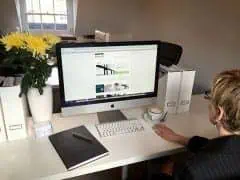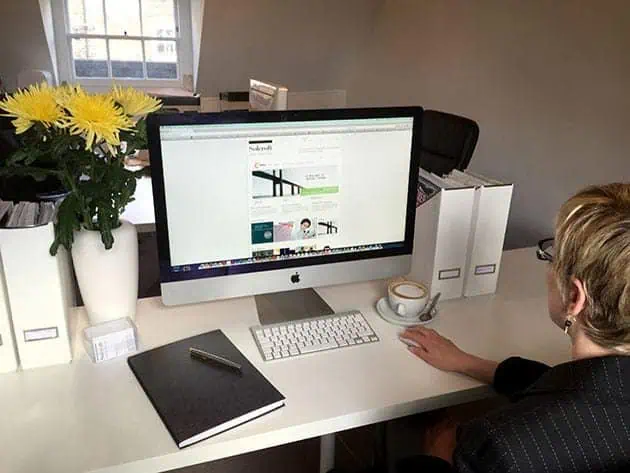
Leaving corporate life to start her own business was a massive step for Stacey Jackson. She needed more challenge and more balance in her life. Failure wasn’t an option. In our Q&A interview, Stacey shares how she successfully made the transition.
Tell us about your business?
Today, I’m proud to say Solcroft is a successful company that stands for intelligent and dynamic communications. I have an office in Highgate Village, which is also home to my creative and administrative team plus various freelance staff when I need them. We have the privilege to work on some inspiring projects, writing and designing corporate and marketing communications for leading public and private sector clients. It’s a good base from which to visit London clients or nip over to Brussels for meetings on our European projects. We have projects spanning a range of sectors from healthcare to telecoms.
Increasingly, Solcroft’s clients have been asking for academic-style reports and what we bring to this type of project is a real ability to dissect things, to build and reinforce an argument where perhaps it hasn’t been properly formed, and draw compelling conclusions that haven’t been made before. For me, this really involves using the academic skills I earned with the OU.
What motivated you to start your own business?
Looking back on my career, I always wanted to stretch myself but I think the career transition I made to set up Solcroft came from realising that there was so much more I could achieve. To truly reach my potential, I needed to build my own business from the ground up.
After completing my maths degree, I had a satisfying career working at the BBC World Service and then Thomson Holidays. After I had my daughter, I had time on my hands in the evenings to think and I began to see that I was treading water in corporate management roles. I knew I could be challenging myself much more, both academically and professionally.
How did you get started?
I knew early on that I wanted to start a communications company and that’s what I set out to do. I knew that to pursue a new direction I would need to find a way to address this while also working full-time and raising my daughter. I found this opportunity through the Open University (OU). Through distance learning, I was able to pursue a Masters Degree in Art History. The whole experience was an incredible eye-opener for me as to what I was capable of, as well as giving me the valuable academic writing and time management skills that I now use every day. I committed every Saturday I had available and every evening from 6pm-10pm to my study.
For me, the degree was a massive achievement. It was definitely no walk in the park, and it was a big thing to see it through. My study taught me to be extraordinarily disciplined, and I carried that through into my business. I also carried with me the belief that if you really want to do something, you can achieve it if you don’t give up. My study definitely gave me the confidence to start up my own business.
In the beginning, it was incredibly challenging; I worked from a desk under the stairs in my house and forced myself to make 100 cold calls a day until I established clients. It took the same type of commitment as finishing my degree, but ultimately I knew that if I wasn’t totally committed then I wasn’t going to do it. Throughout Solcroft’s establishment and growth, I often worked 18 hours a day, seven days a week.
What are your values?
I always give 100 per cent to every client and every job, however big or small.
What marketing tactics work best for your business?
We are fiercely loyal to our clients and always want the best for them. They know that if something goes wrong, like they’ve been let down by a printer, they can call me and I’ll come up with a solution. It isn’t just about the work, but caring about clients.
I also make a point of never forgetting that we are a service for our clients and it is for us to make things happen within their budget and deadlines – not the other way round.
What were the toughest challenges?
Building up the client list and team was a slow process initially, but then we started to get some big names and I realised it was all coming together – around the time that we began a long-term relationship supporting a UN project. That was an exciting and a defining moment for me.
How have you funded the business?
Clients can move on for a number of reasons – such as a loss of budget or a new marketing director that wants to use their usual suppliers – and you have to be prepared for this, making sure the company isn’t over-dependent on any one client. This balance can be hard to achieve, and we did take a knock when a client moved on a couple of years ago. It took about a year to get back on track, but we recovered and it was a valuable lesson. I’ve never had any funding for the business so I just had to get on and made it work, juggling finances around where necessary.
I know from my time as a client that it’s a real pain to be harassed by agencies looking for work. We send our clients a creative and concise email newsletter when we have something interesting to say, as a polite reminder of our existence, and that is proving to be a successful approach.
What are the high points?
One of the things I love about owning my own company is the ability to be in control of my time; I’ve built up a fantastic team and I can incorporate family responsibilities like school meetings and being around during the school holidays into my working day. When it comes to relaxing, I have two greyhounds who are always keen for a walk, and I always try to start the day with a swim – it gives me valuable thinking time when I can’t be distracted by my phone! I’ve always been extremely driven and I don’t believe that failure is an option – I’ve found these traits to be vital in setting up Solcroft.
Who has inspired you and why?
I haven’t been inspired by anyone specifically, I think it was more of an internal motivation to be the best I can, but my dad is always there for me with the right answer!
Three things you have learned?
- Don’t underestimate thinking time – protect some ‘me-time’ every day, even if it’s just ten minutes, and you’ll see things more clearly
- Get the best people around you, then don’t be afraid to delegate as much as you can
- Don’t assume setting up your own business will mean you can work on a laptop in fancy cafes and do a three-day week – if you want to be a success, it’s a real slog.
Your best piece of advice?
My goal now is to keep growing the business and learning along the way, while being there for my daughter. My best piece of advice would be: Believe in yourself always – or pretend you’re someone else that you do believe in.

